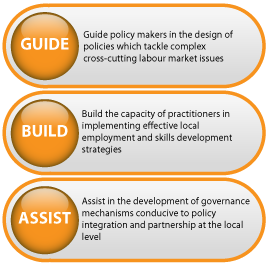Développement économique et création locale d’emplois (LEED)
OECD Southeast Asian Regional Policy Network on Education and Skills
 Southeast Asia is confronted with significant skills and labour market challenges. The region is growing at a rapid pace, industry is becoming more diversified, and job requirements are demanding more complex and sophisticated skills. A highly skilled labour force is increasingly important for economies to remain competitive and achieve sustainable growth. Effective skills strategies can play a significant role in helping national economies to adjust to changes in working practices, advances in technology, and challenges associated with globalisation.
Southeast Asia is confronted with significant skills and labour market challenges. The region is growing at a rapid pace, industry is becoming more diversified, and job requirements are demanding more complex and sophisticated skills. A highly skilled labour force is increasingly important for economies to remain competitive and achieve sustainable growth. Effective skills strategies can play a significant role in helping national economies to adjust to changes in working practices, advances in technology, and challenges associated with globalisation.
The aim of the OECD’s Southeast Asia Regional Policy Network (SEARPN) on Education and Skills is to foster knowledge exchange in support of national growth and regional integration by encouraging a whole-of-government approach to the formation and implementation of skills policies. The SEARPN on Education and Skills builds on the platform of the OECD’s Employment and Skills Strategies in Southeast Asia (ESSSA) initiative, which has been networking skills and labour ministries from ASEAN and OECD Member States since 2008.
PAST EXPERT MEETINGS:
2014 OECD Southeast Asian Regional Policy Network on Education and Skills
OBJECTIVES |
RELATED REPORTS & PAPERSSummary of the 9th Expert meeting Report Summary of the 8th Expert meeting Report Summary of the 7th Expert meeting Report Summary of the 6th Expert meeting Report |
INTENDED PARTICIPANTSParticipants who are envisinged to participate in the initiative include local governments, employment services, training institutions, key partners in local development strategies (including representatives of national governments, employers' and workers' organisations, and selected research/support organisations), international development agencies (multilateral and bilateral) and ILO and OECD staff. Priority will be given to local and national economic development practitioners. |
PARTICIPATING COUNTRIESBrunei Darussalam, Cambodia, Indonesia, Lao PDR, Malaysia, Myanmar, The Philippines, Singapore, Thailand, Viet Nam and neighboring economies such as China, India, Japan, Korea, Australia and New Zealand. |
CONTACT: For further information, please contact Jonathan Barr (OECD, Manager of the ESSSA initiative and Policy Analyst on local governance and employment).
Documents connexes
